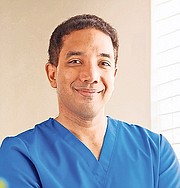By Dr Greggory Pinto
A lack of sleep and low testosterone levels are strongly linked. Sleep deprivation can lead to lower testosterone and low testosterone can lead to poor sleep. This vicious cycle has many men feeling fatigued throughout the day, with difficulty in concentrating and falling asleep very easily, even at dangerous times such as when driving.
In adult men, testosterone is important in maintaining muscle mass, maintaining bone density, red blood cell production, sexual drive and erectile function and sperm production.
Most of the testosterone used during the day needs to be replenished at night.
Obstructive sleep apnea is a relatively common condition faced by men in the Bahamas. Breathing becomes obstructed during sleep and the sleep cycle is deranged.
Normal sleep is divided into non-rapid eye movement (NREM) and rapid eye movement sleep (REM). The normal production of testosterone requires undisturbed, restful sleep that occurs in the rapid eye movement stage (REM) of the sleep cycle.
NREM accounts for about 80 percent of total sleep time, with REM occurring in about 20 percent of the sleep cycle. Patients with obstructive sleep apnea have shorter REM sleep and thus resulting lower testosterone production during sleep.
Sleep disturbances can take many forms and are not just related to obstructive sleep apnea.
Nocturia, which is waking up more than twice in the night to urinate can severely disrupt much needed sleep.
Many middle-aged men live a life of perpetual sleep disturbances with frequent nighttime urination that is often related to the very common condition of benign prostate hyperplasia (BPH), that can be successfully treated by medication or minimally invasive procedures.
Sleep disturbances can be the result due of anxiety or stress and could lead to poor sleep patterns.
Long standing sleep disturbances can lead to elevated levels of the stress hormone cortisol and high cortisol levels lead to lower testosterone.
Symptoms such as waking up more fatigued than when you first went to bed, daytime fatigue, lack of concentration, low sexual drive and erectile dysfunction might be signs of low testosterone. Men who are known to snore loudly at night then have moments of silence, with interrupted breathing, may have obstructive sleep apnea; whereby obese men are at higher risk of suffering from this. There is a correlation between obstructive sleep apnea, high body mass index and low testosterone levels.
Low testosterone, hypogonadism, can have either an organic cause or a functional cause. Functional causes of low testosterone include kidney failure, use of certain drugs, infection or trauma to the testicles or chemotherapy or radiation exposure to the testicle. This could all lead to impaired testosterone production.
Organic hypogonadism involves dysfunction of the hypothalamus-pituitary-testicular axis that leads to low testosterone production, and such patients could benefit from testosterone supplementation. Very rarely, there is a sinister cause for low testosterone in the form of a pituitary macroadenoma tumour, but this must always be ruled out.
The pituitary gland is pea-sized and is located behind the bridge of the nose, and controls the activity of most of the hormone secreting glands in the body. The hypothalamus and pituitary gland are parts of the brain that control testosterone production by the testes.
The management of low testosterone is guided by the cause. Secondary or organic hypogonadism leading to low testosterone may be treated by testosterone replacement therapy in the form of testosterone intramuscular injections, nasal sprays, pellets, testosterone patches or gels.
Treatment of obstructive sleep apnea has shown to increase testosterone levels.
Men of any age may be afflicted with low testosterone but most men symptomatic for low testosterone are middle age or older.
It has been reported that 12 percent of 50-years-olds, 19 percent of 60-year-olds and 28 percent of 70-year-olds fit the criteria of hypogonadism, low testosterone.
Feeling constantly fatigued and putting on unwanted weight, losing muscle mass, with worsening erections and lack of interest in sex?
Low testosterone should be investigated as well as possible obstructive sleep apnea.
Stop living life fatigued with poor concentration, disappointing erections and never-ending weight gain.
Seek confidential, compassionate and comprehensive urological care.
• Dr Greggory Pinto is a Bahamian urologist who has trained in South Africa, Germany, France and India. He is a member of the European Association of Urologists. Dr Pinto can be reached at the Urology Care Bahamas at the Surgical Suite, Centreville Medical Centre, Collins Avenue and Sixth Terrace. Call 326 1929; e-mail: welcome@urologycarebahamas.com, or visit www.urologycarebahamas.





Comments
Use the comment form below to begin a discussion about this content.
Sign in to comment
OpenID